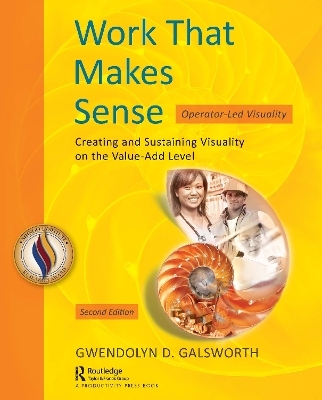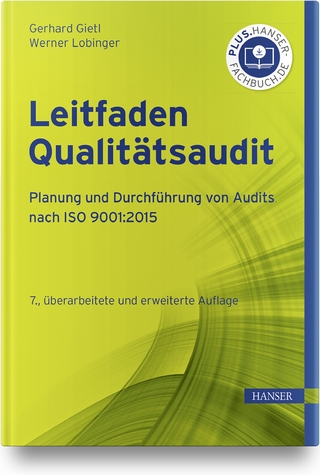
Work That Makes Sense
Productivity Press (Verlag)
978-1-032-05485-8 (ISBN)
This book presents the mechanics of implementing visuality on the value-add level known as Work That Makes Sense (WTMS). The step-by-step WTMS process described in this book teaches operators a proven method for translating information deficits into visual solutions that take the struggle out of their day-to-day work. As a result, operators transform their work area into a work environment that speaks—a work environment that, by design, shares vital information in the form of visual devices that help them perform their day-to-day work with precision and completeness.
At the heart of this visual conversion approach is an element unique to Galsworth’s paradigm called I-driven that recognizes that operators will pursue self-leadership in the company’s improvement initiatives if they are given the opportunity to learn how to do so. Also recognized is the fact that this can only happen if associates are taught—and given the opportunity to learn and apply a new system of thinking. The author calls this new system visual thinking.
This book provides that learning pathway, in detail, supported by hundreds of actual visual solutions, developed by operators who have followed that pathway and become visual thinkers for themselves—I-driven. They become self-leaders, in control of their corner of the world and able and willing to share their strengths with others. In this way, the WTMS process produces a deep and abiding change in the company’s work culture that builds creativity and ownership. As a result, the organization’s leadership framework widens to include operators.
When effectively applied the WTMS process detailed in this book produces 15% to 30% improvement in local KPIs, including productivity, on-time delivery, quality, and costs; these figures are documented and presented in the pages of this book.
Written for operators, this book includes a wealth of color photographs, the majority of which are visual solutions created by visual thinkers who have lived this process for themselves. All are fully captioned and thoughtfully described. The book also includes twelve tasks that managers implement in support that they seek on the operator level. WTMS teaches that visual devices translate information into exact behavior, embedding and sustaining precision through visual solutions. Precision is built in by the same operators who execute it. This is the heart of an I-driven visual enterprise. Once learned and operationalized, this paradigm allows the organization to take on any new improvement effort. Organizational alignment and teamwork have been redefined and operationalized.
Gwendolyn D. Galsworth, PhD, is president/founder of Visual Thinking Inc. and The Visual‐Lean Institute® (collectively “VTI”). Dr. Galsworth formed her company in 1991 as a consulting, training, and research firm, specializing in the technologies of the visual workplace. Since then, she has focused on codifying the field of visuality into a single coherent framework of thinking and application. In 2005, Dr. Galsworth established the Visual‐Lean® Institute where inhouse trainers and external consultants are trained and licensed in nine core visual workplace courses—including Visual Machine®, Visual‐Lean® Office, and Visual Leadership. In this way, they can train and implement these in their own companies (or with their clients) and achieve a fully‐functioning, self‐sufficient visual enterprise. VTI conducts seminars, workshops, and train‐the‐trainer events in the USA and around the world. A former Baldrige and Shingo Prize examiner (eight years), Dr. Galsworth helps companies all over the world to accelerate their rate of visual transformation, strengthen cultural alignment, and achieve long‐term, sustainable bottom‐line outcomes. Her clients include: Lockheed‐Martin, Hamilton Standard, Pratt & Whitney, Hitchcock Industries, Royal Nooteboom Trailers/Holland, Crown Equipment/Mexico, Trailmobile/Canada, Parker Denison, Crown/Mexico, Rolls‐Royce/UK, TVS Sundaram Clayton/India, Crompton Greaves/India, Sears Home Services, United Electric Controls, and Wilson Transformer /Australia. She is a former Malcolm Baldrige and Shingo Prize Examiner. Dr. Galsworth and her team are continually transforming their research—new knowledge and knowhow— into improved products to assist you on your journey to workplace visuality. Recognizing the fit between The Shingo Prize and workplace visuality, Robert Miller, former executive director of The Prize, put it this way: “The visual workplace, as taught by Gwendolyn Galsworth, is in perfect harmony with the model of Operational Excellence represented by The Shingo Prize. The concepts, tools, and methods of visuality are essential as we pursue other guiding principles of seeking perfection, quality at the source, and the continuous flow of value to customers.” Dr. Galsworth is a Teaching Fellow on the faculty of the Shingo Institute and author of seven books on workplace visuality and strategic improvement. Her ground‐breaking book, Work That Makes Sense: Operator‐Led Visuality, contains over 500 full‐color visual solutions and provides a step‐by-step process that operators follow to convert their work areas to visuality that is sustainable. Galsworth’s book, Visual Workplace‐Visual Thinking, provides a complete foundation in visual principles and practices and her 10‐ Doorways model. Both books are winners of the prestigious Shingo Prize. Her book on the cost of complexity, Smart Simple Design/Reloaded, takes a hard look at the costs and challenges of product diversification. In it, she maps out the Variety Effectiveness Process (VEP), a proven method for de‐complicating the organization by simplifying product architecture and dismantling layers of imbedded complication that choke a company’s infrastructure and product design process. Once VEP is effectively applied, the need for both visual and lean is significantly less urgent. Galsworth’s books are available globally from our website (visualworkplace.com) and on Amazon, in print and on Kindle. Dr. Galsworth’s career in operational excellence began as the head of training and development at Productivity Inc. in the early 1980s. There she worked closely with Dr. Ryuji Fukuda to adapt the CEDAC® method for western audiences—and with Dr. Shigeo Shingo to develop, among many things, poka‐yoke as an implementation methodology for the West. While there, she was also principal developer and implementer of Visual Factory, TEIAN (operator‐led suggestion systems), and Hoshin Kanri/X‐Type Matrix Planning (policy deployment). Gwendolyn holds a Ph.D. from Indiana University, has led study missions to some of the world’s finest companies, including in Japan, and is a frequent keynote speaker. Podcasts from her weekly radio show, Visual Workplace Radio, and over 100 articles from The Visual Thinker newsletter can be found on her website, www.visualworkplace.com Dr. Galsworth now lives in New England where she happily works, hikes, and writes. She can be reached at 503‐233‐1784 or through visualworkplace.com.
Chapter 1. Introduction to The Visual Workplace Chapter 2. The Building Blocks of Visual Thinking SECTION TWO Chapter 3. Your Implementation Tool Box Chapter 4. Smart Placement: Logic, Meaning, Mapping Chapter 5. Smart Placement Principles (1-7) SECTION THREE Chapter 6. Smart Placement Principles (8-14) Chapter 7. Visual Where: Borders Chapter 8. Visual Where: Address and ID Label Chapter 9. Ourselves and Others Chapter 11. Visual Mini-Systems & Customer-Driven Chapter 12. The Four Power Levels Chapter 13. We Are Visual Beings
| Erscheinungsdatum | 07.06.2022 |
|---|---|
| Zusatzinfo | 300 Line drawings, color; 300 Illustrations, color |
| Verlagsort | London |
| Sprache | englisch |
| Maße | 191 x 235 mm |
| Gewicht | 453 g |
| Themenwelt | Wirtschaft ► Betriebswirtschaft / Management ► Logistik / Produktion |
| Wirtschaft ► Betriebswirtschaft / Management ► Unternehmensführung / Management | |
| Wirtschaft ► Volkswirtschaftslehre | |
| ISBN-10 | 1-032-05485-9 / 1032054859 |
| ISBN-13 | 978-1-032-05485-8 / 9781032054858 |
| Zustand | Neuware |
| Informationen gemäß Produktsicherheitsverordnung (GPSR) | |
| Haben Sie eine Frage zum Produkt? |
aus dem Bereich


